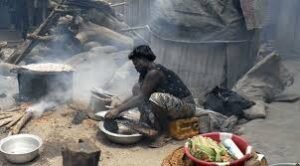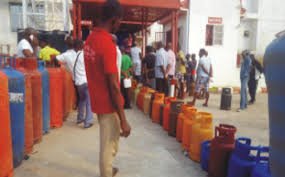Since President Bola Tinubu took office in May 2023, Nigeria has witnessed escalating economic hardship, fuelled by soaring inflation and policy somersaults. Juliet Jacob of Africa Health Report analyses how Tinubu’s economic policies have had devastating effects on Nigerians.
Nigerians Facing Challenges


Nigeria has been facing many challenges, including insecurity, insurgency and separatist agitations, which have taken a toll on its economy.
From 2015 to 2022, Nigeria’s growth rates decreased, and GDP per capita flattened due to policy missteps and external shocks like the COVID-19 pandemic and Russia’s invasion of Ukraine.
However, with the new administration of President Bola Tinubu in place since May 2023, the country has been pursuing bold reforms to reestablish macroeconomic stability and growth.


Some of these reforms include eliminating the fuel subsidy, unifying the exchange rate, and tightening monetary policy.
These measures have not helped Nigeria’s economy turn the corner, but rather inflation remains high, increasing hardship and poverty.
Despite being Africa’s largest economy, Nigeria still offers limited opportunities to most of its citizens.
The poverty rate is estimated to have reached 38.9% in 2023, with an estimated 87 million Nigerians living below the poverty line.
Inflation and Policy Failures Take Toll
Nigeria, Africa’s largest economy, is grappling with escalating economic hardship as inflation and policy failures continue to batter the nation. The country’s economic woes have raised concerns among citizens, experts, and international organizations.
Nigeria’s Inflation Hits 17-Year High Amid Food and Fuel Price Surge


Nigeria’s inflation rate skyrocketed to a 17-year high of 20.5% in August 2023, dealing a devastating blow to households, particularly low-income families.
Nigeria’s headline inflation rate quickened to 32.7% in September 2024, up from 32.2% in the prior month, marking the first increase in three months.
The alarming increase, driven by soaring food and fuel prices, has stretched the budgets of millions, making basic necessities unaffordable.
This surge in inflation adds to the country’s economic woes, exacerbating poverty and hardship for Nigeria’s most vulnerable populations.
Policy Failures
Nigeria’s government is facing intense backlash over its economic policies, which critics argue have worsened the country’s economic crisis.
The recent removal of fuel subsidies, a move deemed necessary for long-term reform, has led to a sharp increase in fuel prices, further fuelling inflation and putting a strain on households, particularly low-income families.
The subsidy removal has sparked widespread protests and unrest, with many Nigerians feeling the pinch of rising costs.


According to experts, the fuel subsidy removal will have long-lasting negative inflationary effects, exacerbating economic challenges among residents across all social strata.
The World Bank warns that if the current situation persists, an additional 4 million citizens may be added to the 133 million already enmeshed in multidimensional poverty.



Currency Fluctuations Wreak Havoc on Nigerian Economy
The Nigerian Naira has plummeted to a record low, depreciating significantly against major currencies and wreaking havoc on the economy.

The decline has severely reduced purchasing power, making imports increasingly expensive and further exacerbating inflation, which already stands at 22.79%.
This currency fluctuation has delivered a devastating blow to businesses and households, threatening economic stability and deepening the country’s financial woes.
Nigeria’s Insecurity Crisis Takes Economic Toll
Nigeria’s persistent insecurity and insurgency have severely impacted the country’s economy, disrupting economic activity, deterring investment, and slashing government revenue.
Violence and unrest in regions such as the North East, Niger Delta, and South East have forced businesses to shut down, halted infrastructure projects, and driven away potential investors.
The resulting economic losses are estimated to be in billions of dollars, exacerbating Nigeria’s economic woes and undermining efforts to lift millions out of poverty.
Corruption and Bureaucratic Inefficiencies
Nigeria’s entrenched poverty and hardship crisis has been exacerbated by deep-seated structural issues, including rampant corruption and bureaucratic inefficiencies.
Experts point to widespread graft, embezzlement, and nepotism as major obstacles to economic development, diverting vital resources away from essential public services and infrastructure.
Additionally, cumbersome bureaucratic processes hinder business growth, discourage investment, and perpetuate inequality.
With an estimated 87 million Nigerians living below the poverty line, the country’s leaders face mounting pressure to tackle these systemic issues, promote transparency, and implement reforms to unlock Nigeria’s vast economic potential.
Nigeria’s Economic Sectors Face Perfect Storm
Nigeria’s economy is struggling across multiple sectors, threatening the country’s stability and prosperity.
The agricultural sector, which accounts for a significant portion of Nigeria’s GDP, is grappling with reduced productivity and food insecurity.
Factors such as inadequate irrigation, outdated farming techniques, and insecurity in rural areas have hindered growth, leaving millions vulnerable to hunger.
The manufacturing sector is also reeling, with reduced capacity utilization and widespread business closures.
High operating costs, inadequate infrastructure, and competition from cheap imports have crippled local industries, leading to job losses and economic contraction.
This decline has severe implications for Nigeria’s economic diversification efforts and its ability to reduce dependence on oil exports.
The oil and gas sector, Nigeria’s primary revenue source, is facing volatility in global prices and reduced government revenue.
The decline in oil prices has exposed the country’s vulnerability to external shocks, highlighting the need for economic diversification. With reduced government revenue, Nigeria’s ability to fund essential public services and infrastructure projects is severely compromised.
The services sector, which accounts for nearly half of Nigeria’s GDP, is also struggling. Reduced consumer spending, coupled with struggling small businesses, has stifled growth.
As households grapple with rising inflation and unemployment, discretionary spending has dwindled, impacting businesses in retail, hospitality, and other service-oriented industries.
Analysts say to revitalize Nigeria’s economy, policymakers must address these sectoral challenges through targeted reforms, investments, and policy interventions.
World Bank Gloomy Prediction
Nigeria’s economic woes are deepening, with economists warning that the number of citizens living below the poverty line may soon surpass the 104 million projected by the World Bank in 2023.
The recent hike in petrol prices and persistent food supply challenges are exacerbating the crisis, which saw poverty rates jump to 46% last year. This alarming trend threatens to further entrench poverty, with millions already struggling to make ends meet.
The World Bank’s Nigeria Development Update reports have highlighted the country’s economic struggles, including slowed growth and reduced economic stability.
As the situation continues to deteriorate, concerns grow about the long-term impact on Nigeria’s most vulnerable populations.
Rising Poverty
According to the he National Bureau of Statistics (NBS), poverty rate is estimated to have reached 38.9% in 2023, with an estimated 87 million Nigerians living below the poverty line — the world’s second-largest poor population after India.
Nigeria’s Human Capital Crisis
Despite being Africa’s largest economy and most populous nation, Nigeria is failing to provide adequate opportunities for its citizens.
According to the World Bank’s Human Capital Index, Nigerians born in 2020 are expected to reach only 36% of their potential productivity due to limited access to education and healthcare, ranking 7th lowest globally.
This stark reality has severe consequences, as weak job creation and entrepreneurial prospects struggle to absorb the 3.5 million Nigerians entering the labor force annually.
As a result, many skilled workers are choosing to emigrate in search of better opportunities, depriving the country of vital talent and further hindering Nigeria’s economic growth and development.
Nigerians Struggle to Make Ends Meet
Nigerian citizens are facing unprecedented hardship as the country’s economic crisis continues to bite, with millions struggling to afford basic necessities like food, healthcare, and education.
The soaring inflation rate has severely eroded purchasing power, leaving many families unable to make ends meet.
The alarming trend has seen households cut back on essential expenses, with some forced to choose between food and other vital necessities.
Experts warn that the situation may worsen unless urgent action is taken to address the country’s economic woes, further entrenching poverty and inequality among Nigeria’s most vulnerable populations.
According Dr Ahmed Akintola, an Abuja-based developmental economist, the Tinubu government needs to take an urgent step to salvage the current situation.
“The government needs to address structural issues, diversify the economy, and implement targeted social welfare programs to cushion the impact of inflation.” Dr Akintola said.
Nigeria Grapples with Soaring Food and Energy Insecurity
Nigeria is facing escalating food and energy insecurity, exacerbating the country’s economic and humanitarian crises.
Food prices have skyrocketed, with inflation reaching 37.77 as of September, leaving millions struggling to afford basic necessities.
The country’s agricultural sector is hindered by inadequate irrigation, outdated farming techniques, and rural insecurity.
Meanwhile, energy shortages persist due to inadequate power supply, refining capacity, and distribution challenges.
The resulting scarcity of gasoline and diesel has crippled businesses, transportation, and daily life, deepening widespread hardship.
Experts warn that urgent action is needed to address these intertwined crises, which threaten Nigeria’s stability and the well-being of its 220 million citizens.
Nigeria’s economic challenges require swift, decisive action. The government must balance short-term relief with long-term structural reforms to revitalize growth, reduce poverty, and restore economic stability.
Welfare Programmes Offer Hope
Nigeria has been exploring targeted social welfare programmes as a crucial strategy to combat poverty, which affects over 87 million citizens.
Initiatives like the National Social Investment Programme (NSIP) and the National Cash Transfer Programme (NCTP) aim to provide financial support, education, and skills training to vulnerable populations.
These programmes have shown promise in reducing poverty, improving food security, and enhancing economic opportunities. By targeting specific needs and demographics, such as low-income families, women, and youth, these initiatives can help break the poverty cycle.
Experts emphasize the importance of scaling up and sustaining these efforts to achieve meaningful impact. Effective implementation, transparency, and collaboration with stakeholders are essential to ensuring Nigeria’s social welfare programmes yield tangible results.
Economic Diversification
Nigeria’s decades-long reliance on oil exports has left the country vulnerable to global market fluctuations, exacerbating poverty and economic instability.
To break this cycle, experts advocate economic diversification as a crucial solution. Diversifying Nigeria’s economy would reduce dependence on oil revenues, foster inclusive growth, and create jobs.
Nigeria’s economy is on the cusp of a transformative shift, and economic diversification is the key. It is argued that leveraging its fertile land and large workforce, Nigeria can boost food security and export-oriented farming, making agriculture a vital sector for growth.
The manufacturing industry also holds tremendous potential, with local industries like textiles and electronics poised to replace imports and drive innovation.
Additionally, enhancing tourism, IT, and financial sectors can capitalize on Nigeria’s vast consumer market, further fueling economic expansion.
However, experts say successful diversification requires more than just identifying growth areas. It demands a comprehensive approach that includes infrastructure development, business-friendly policies, investment in human capital, and anti-corruption measures.
Upgrading transportation networks, energy supply, and digital connectivity will provide the necessary foundation for growth. Streamlining regulations, reducing bureaucracy, and promoting competition will encourage entrepreneurship and innovation.
Investing in education, vocational training, and healthcare reforms will develop a skilled workforce, while ensuring transparency and accountability in government and private sector dealings will foster trust and stability.
Investment in Human Capital
Experts say Nigeria’s chronic poverty crisis can be effectively addressed through strategic investment in human capital, experts argue.
Developing education, vocational training, and healthcare systems can equip Nigerians with essential skills and knowledge, enhancing employability and productivity. Improved education will boost literacy rates, while vocational training will provide alternatives to traditional employment.
Access to quality healthcare will increase life expectancy and reduce mortality rates. By investing in its citizens, Nigeria can unlock its demographic dividend, leveraging its vast youth population to drive economic growth.
Estimates suggest that every 1% increase in education level can lift 3.7% of the population out of poverty.
Nigerians who spoke with Africa Health Report (AHR) were of the opinion that government’s commitment to human capital development will be crucial in breaking the poverty cycle, fostering inclusive growth, and securing a brighter future for Africa’s largest economy.
Monetary Policy Adjustments
Experts advise the Central Bank of Nigeria (CBN) to expedite action on exploring monetary policy adjustments to combat the country’s persistent poverty crisis.
Key measures experts suggest include interest rate adjustments to stimulate lending and entrepreneurship and increased access to credit for small-scale farmers and businesses.
The government is also urged to target interventions in critical sectors like agriculture and manufacturing and strengthene financial inclusion initiatives.
Experts say these measures can have a positive impact on Nigeria’s 87 million poor citizens. Effective implementation and coordination with fiscal policies will be crucial.
Security Sector Reforms
Nigeria’s entrenched poverty crisis is intricately linked to its security challenges, underscoring the need for comprehensive security sector reforms.
Experts emphasize effective reforms as one of the best ways to disrupt the vicious cycle of insecurity and poverty by safeguarding rural communities, enabling agricultural productivity, and facilitating economic activity.
By tackling Boko Haram, banditry, and kidnapping, reforms can also reduce displacement and rebuild trust in affected regions.
Moreover, security sector reforms can address corruption, improve resource allocation, and enhance governance. This, in turn, can unlock investments, stimulate growth, and create jobs.
Experts estimate that every 10% increase in security can yield a 2-3% increase in GDP growth.
Bold security sector reforms offer a critical pathway to reducing poverty, promoting stability, and ensuring sustainable development.
As Nigeria navigates this economic storm, the government’s response will be crucial in determining the country’s future prosperity.




Thinker Pedia Great information shared.. really enjoyed reading this post thank you author for sharing this post .. appreciated
Thinker Pedia Nice post. I learn something totally new and challenging on websites